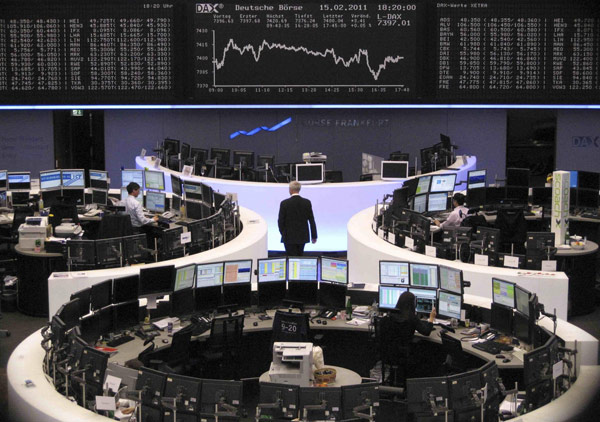Global Biz
D.Boerse unveils NYSE deal, faces bumpy road
(Agencies)
Updated: 2011-02-16 10:33
 |
Large Medium Small |
FRANKFURT/NEW YORK - Deutsche Boerse faces a long, hard struggle to get approvals from a host of regulators for its $10.2-billion takeover of NYSE Euronext to form the world's largest exchange operator.
|
 Traders are pictured at their desks in front of the DAX board at the Frankfurt stock exchange Feb 15, 2011. Deutsche Boerse and NYSE Euronext announced the creation of the world's largest exchange operator on Tuesday, dodging political issues that could threaten completion of a deal. [Photo/Agencies] |
It is expected to take until the end of the year before the politically-charged deal, which was agreed on Tuesday, can go ahead. "We have a bumpy road ahead of us," said Deutsche Boerse Chief Executive Reto Francioni, who would become chairman of the combined entity.
In a sign of the difficulty of keeping lawmakers and regulators on both sides of the Atlantic happy, the companies parked key questions that could threaten the accord. Foremost among those was what the merged company would be called.
|
||||
"There's a lot of national pride particularly in the businesses we operate," he said, adding the name would need to address political concerns on both continents.
The deal -- packaged and sold as a merger of equals -- accelerates a wave of tie-ups in the increasingly competitive and global exchange world, where companies are banding together and pushing into derivatives to survive and grow.
Deutsche Boerse shareholders will control 60 percent of the new company and 10 of 17 board seats. Still there are suspicions in Germany that NYSE management will be in the driver's seat, in addition to concerns in the United States that the New York Stock Exchange will lose influence and independence.
That tension could raise political obstacles. Complicating things, the merged entity would dominate exchange-based European derivatives trading -- raising difficult antitrust questions.
"People are worried there could be an extended fight," said Frank Davis, director of sales and trading at Lek Securities in New York. "There may be some nationalistic posturing, especially on the US side now that we know that the majority of board members will be German."
The merged entity will have more than $20 trillion in annual trading volume, and operations spanning the United States, Germany, France, Britain, the Netherlands, Portugal and Belgium. Company executives stressed that the Big Board -- the two-century-old icon of American capitalism -- would not be harmed.
The deal values NYSE Euronext at about $39 a share. That's 13 to 14 times the company's expected 2012 earnings, and could be seen as cheap provided the merged entity can deliver on promises of growth and cost-cutting, analysts said.
A source familiar with the deal said 55 percent of the shareholders in the new company would be from the United States, with 11 percent from Germany, 11 percent from Britain and 23 percent from the rest of the world.
Under the terms of the deal, each NYSE Euronext share will be exchanged for 0.47 share in the new company; Deutsche Boerse shares will be swapped on a one-for-one basis, the companies said in a statement.
| 分享按钮 |


